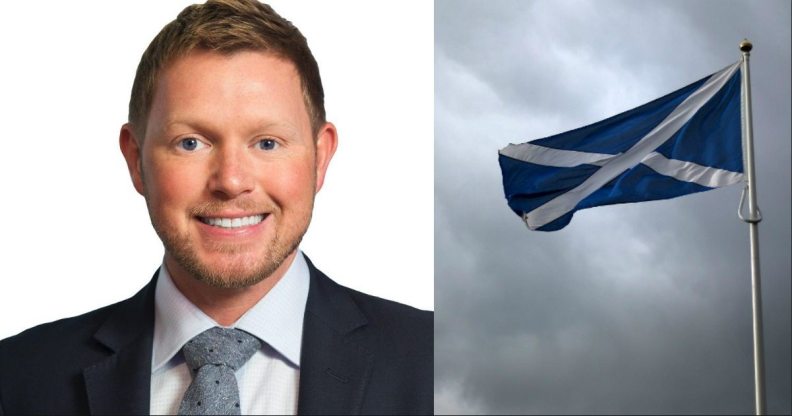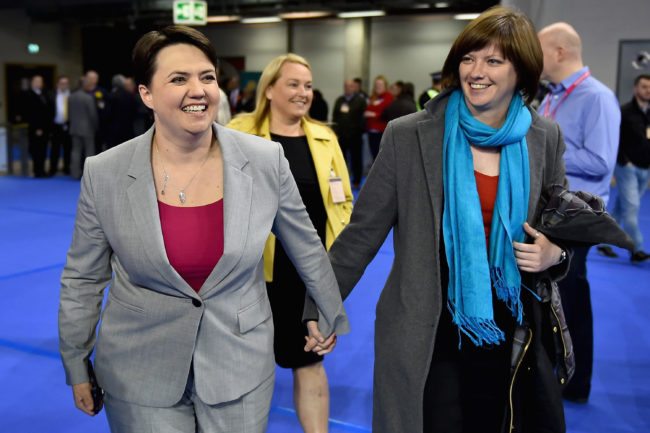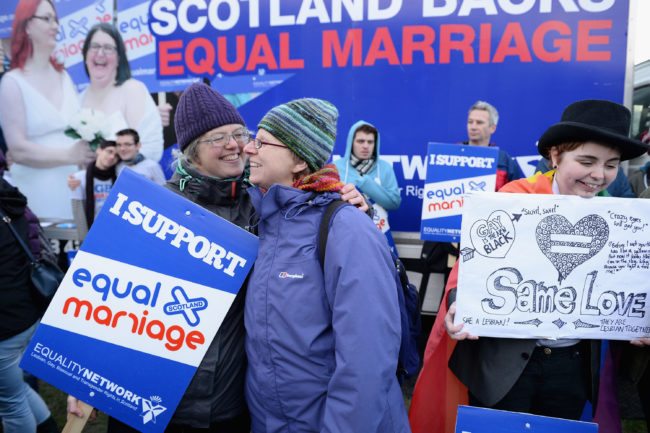Jamie Greene MSP: Scotland risks failing LGBT young people if we don’t improve

“Gay rights are human rights!” This isn’t a chant from a Pride march, or the wording from a protest placard. It is a phrase I have uttered, as a Conservative politician, in the sphere and realm of the Scottish Parliament.
Something which half a century ago may have seemed unthinkable in UK politics. In fact, after joining the Scottish Parliament, I naively enquired as to how I go about joining the Parliament’s LGBTI Cross Party Group (known as All Party Parliamentary Groups in Westminster). I was surprised to learn that, in fact, in the enlightened 18-year history of this modern powerhouse of Scottish politics that no such group had been created.
With haste, I set one up, achieving cross party support to do so and held our inaugural meeting just over a year ago. The “CPG” has gone from strength to strength. Covering a wide range of issues affecting Scotland’s LGBTI+ community – from healthcare provision and prevention, geriatric care, transgender issues, bullying and inclusive education. We even looked at life as an LGBTI person in rural Scotland.

Jamie Greene MSP
I’m proud of what this group has achieved but I’m aware that setting the group up is not an end in itself; it doesn’t achieve change by simply being there.
The problem facing modern politics is that decisions are too often made through the prism of the public opinion rather than our underlying conviction. It’s true that successful parties must have a certain fluency in PR, but the balance between true convictions and political spin is quickly being eroded. Too often it seems that parties send out policies in the space of press releases.
Let me give you an example. Earlier this month, the Scottish Government confirmed that, on its behalf, Nicola Sturgeon would apologise to gay men convicted of now-abolished sexual offences. I fully welcome this, I really do; there is truly little to argue with. It not only acknowledges that no wrongdoing actually took place, but for many gay men it will wipe the slate clean.
This decision however is still largely symbolic in many ways and it would be a mistake if we were to accept symbolism in the place of progress. The apology has gathered widespread attention, but the public’s attention might also be directed to what’s really happening on the ground in Scotland.

Leader of the Scottish Conservatives Ruth Davidson and partner Jen Wilson
I write this on the back of some very troubling figures that were published in the Equality Network’s 2017 Scottish LGBTI hate crime report which found that hate crime against LGBTI in Scotland is still very much an issue.
The report made for difficult reading. 66% of homosexual respondents have been the target of hate crime at some point in their lives, this figure rises to 77% of intersex respondents and 80% of transgender respondents. Incidents range from verbal abuse, to physical attacks or sexual assault. These acts of hate crime aren’t historic; many of these were recorded in the last 12 months.
Just last year the Time for Inclusive Education (TIE) Campaign’s report on LGBTI youths revealed that 52% received direct homophobic bullying at school, 54% were deliberately and regularly self-harming and 1 in 4 had attempted suicide at least once.
Now let’s look at Stonewall Scotland’s most recent survey which was published last month. Hate crime against LGBTI people in Scotland has almost doubled in the last four years and is rising faster than across the rest of the UK. The manifestations of hate crimes today have changed; societal views and technology are very different from when I was teen, but the numbers speak for themselves.
I know these aren’t just statistics because my Facebook feed is often filled with horror stories of abuse, attacks and barbarism directed at our community. Some are tragic stories from far flung places like Chechnya or Syria. Others are from friends of friends who have been beaten up on the way home from a night out in London or Glasgow.
It is not all doom and gloom in Scotland; we have become a much more open society. It was just a few months ago that two gay women, Ruth Davidson and Kezia Dugdale, were leading Scotland’s two largest opposition parties. This might have been unthinkable 25 years ago.

(Photo by Jeff J Mitchell/Getty Images)
I must add, however, if we keep patting ourselves on the back for the steps we have taken, then our progress is likely to have been made in vain should we forget to finish the journey we’re on and continue to strive for better.
The Scottish Government regularly tries to paint a picture of modern Scotland being a more liberal, tolerant and accepting society than our neighbours in England, Wales and Northern Ireland or indeed across the Western world. In some ways it is, and I am proud to acknowledge that.
In that context however I take no pleasure in pointing out that by focusing attention on political gestures and proclamations of progress, we risk brushing over some extremely serious issues that still aren’t being addressed.
We simply aren’t the epitome of a liberal society that we want to believe we are, or worse, that we want the media to show us to be.
If we continue to allow things to carry on the way they are then we risk failing an entire generation of LGBTI people who will continue to feel misplaced at school, who will continue to self-harm, who will continue to find themselves on the receiving end of assaults and abuse and, I’m afraid to say, who will continue to consider putting an end to it all.
This article isn’t a cheap pop at anyone. It’s not a party political broadcast on behalf of the ‘Jamie Greene; I’m a gay politician’ Party. In fact, this has been a difficult piece of prose to express. However, I feel I must suggest that if we continue to look at our country through rose-tinted glasses, we won’t be able to spot the red flags that critical annual surveys wave in our faces.
So let’s be proud of our achievements over the past few decades, for much has been achieved, but let us never rest on our laurels politically or pretend that the job is done for the sake of a good news story on the TV.
Pardons are very welcome, but progress must be our priority. Whilst we must talk about LGBTI rights in the corridors of power, talking about action is different from taking action.
Jamie Greene is a Scottish Conservative MSP for West Scotland and Shadow Minister for Transport & Infrastructure. He is Co-Convenor of LGBTI Cross Party Group.

